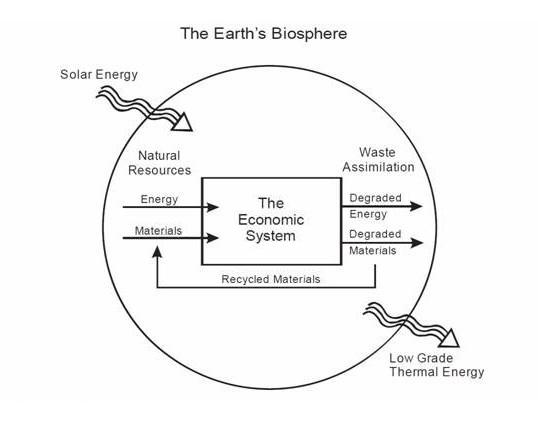Eco-economics
A lecture by Robert Skidelsky on Keynes (gosh he is so sharp at the age of 79) prompts thought of eco-economics, which he mentioned as one answer to the post-2008 slump critique of mainstream economics. Maynard Keynes of course had a wider view than many mainstream economists.

Ecological economics has quite a history. The current interest dates back to the 1980s. This led to Ecological Economics: energy, environment and society: (1990) by the Spanish economist Juan Martinez-Alier. Although one can trace some ideas back to E.F Schumacher’s Small is beautiful – a study of economics as if people mattered (1973) or beyond to the likes of the Austrian economist Karl Polanyi.
Eco-economics is characterised firstly by recognising an economic system has both an impact on the ecology and is in turn influenced by it. For example, different ways of organising production and consumption affect our natural environment in ways which differ, and similarly the response of the natural environment also differ. Secondly eco-economics uses thermodynamic theory and ideas of entropy to examine the relationships between economic and ecological activity. Key to this is the idea that natural systems cannot be monetised as a set of commodities. Rather energy flows, use of renewable and non-renewable resources and the use of the planet as a sink for waste should each be monitored separately and in physical terms. Thirdly eco-economics is used to argue that the potential costs of inaction are so severe that a democratically approved course of action should be pursued.
Eco-economics differs from environmental economics in this respects, it rejects the notion that natural capital can be substituted by human-made capital. And this argument can be extended to the notion that there is not necessarily a technological fix for all environmental problems.
Malte Faber (of Heidelburg) in his lecture How to be an Ecological Economist argues that mainstream economics lacks adequate concepts of nature, justice and time and he argues that “interest in nature, justice and time are the essential characteristics of Ecological Economics” He also argues that:
“A successful politician, a wise judge, an effective manager and a good
scientific adviser all have in common that their decisions and counsel cannot be deduced entirely from scientific concepts. What distinguishes them is the quality termed in the German philosophic tradition “Urteilskraft”, in English “power of judgement”, “prudence” or “practical wisdom” (i).
And as the Wikipedia article on ecological economics argues “issues of intergenerational equity, irreversibility of environmental change, uncertainty of long-term outcomes, and sustainable development guide ecological economic analysis and valuation” (ii).
The earth’s carrying capacity is a fundamental concern of eco-economics, and this was a key issue of the Club of Rome’s Limits to Growth 1972. And this leads to concern for sustainable agriculture, fishers and energy production. Some economists forecast a crisis and unrest if energy growth is not contained (iii) and this is increasingly echoed in military academics and defence think tanks.
There is much in this which is of interest to landscape architects. Water to drink, air to breath, soil to produce food, biodiversity to maintain ecosystems are all of interest to us.
Footnotes
(i) Malte Faber. (2008). ‘How to be an ecological economist.’ Ecological Economics 66(1):1-7 https://ideas.repec.org/p/awi/wpaper/0454.html p. (accessed 15.4.2017) p.3.
(ii) Ecological Economics: https://en.wikipedia.org/wiki/Ecological_economics ((accessed 15.4.2017)
(iii) Nicholas Stern Stern Review on the Economics of Climate Change HM Treasury: 2006 http://webarchive.nationalarchives.gov.uk/20100407172811/http://www.hm-treasury.gov.uk/stern_review_report.htm (accessed 15.4.2017)
